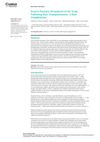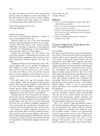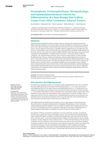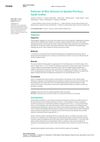 September 2023 in “Cureus”
September 2023 in “Cureus” Nails can reveal important health information about skin and body conditions.
 February 2024 in “Curēus”
February 2024 in “Curēus” Topical 5-Fluorouracil can rarely cause nerve damage, especially in people with a certain genetic deficiency.
 February 2025 in “Cureus”
February 2025 in “Cureus” Hair transplants can rarely cause scalp inflammation leading to hair loss, needing early detection and treatment.
 7 citations,
February 2004 in “Canadian Journal of Anesthesia/Journal canadien d anesthésie”
7 citations,
February 2004 in “Canadian Journal of Anesthesia/Journal canadien d anesthésie” Pressure from surgical headrests can cause temporary hair loss in liver donors.
4 citations,
June 2023 in “Frontiers in immunology” JAK inhibitors help hair regrowth in alopecia areata but have a high risk of side effects.
 5 citations,
August 2020 in “Curēus”
5 citations,
August 2020 in “Curēus” The document concludes that recent studies help tell apart desmoplastic trichoepitheliomas from other skin tumors, but more research is needed for clear differentiation.
 January 2012 in “Postgraduate obstetrics & gynecology”
January 2012 in “Postgraduate obstetrics & gynecology” Up to half of women by age 50 experience significant hair loss, with various types and treatments available.
 August 2024 in “Frontiers in Public Health”
August 2024 in “Frontiers in Public Health” Alopecia Areata severely impacts mental health, causing anxiety and depression, affecting quality of life.
2 citations,
July 2022 in “Frontiers in Medicine” Combining minoxidil with microneedling or spironolactone is more effective for female hair loss than using minoxidil alone.
 14 citations,
February 2023 in “Frontiers in immunology”
14 citations,
February 2023 in “Frontiers in immunology” Immune checkpoint inhibitors can cause skin issues but are linked to better cancer outcomes.
 3 citations,
September 2023 in “Frontiers in immunology”
3 citations,
September 2023 in “Frontiers in immunology” Chronic inflammatory skin diseases are caused by disrupted interactions between skin cells and immune cells.
 January 2024 in “Frontiers in Bioengineering and Biotechnology”
January 2024 in “Frontiers in Bioengineering and Biotechnology” A new method using stem cell membranes to deliver Minoxidil improved hair growth in mice better than Minoxidil alone.
November 2021 in “Frontiers in medicine” A patient with both bullous lichen planus and systemic lupus erythematosus showed improvement with treatment.
 June 2024 in “Nature Cell and Science”
June 2024 in “Nature Cell and Science” The Scalp Coverage Scoring method reliably measures hair density from images.
 December 2024 in “Frontiers in Pediatrics”
December 2024 in “Frontiers in Pediatrics” Baricitinib improved platelet counts and alopecia in a 16-year-old with chronic immune thrombocytopenia.
 99 citations,
July 2017 in “Clinical Reviews in Allergy & Immunology”
99 citations,
July 2017 in “Clinical Reviews in Allergy & Immunology” New treatments for Alopecia Areata show promise but need to be more effective and affordable.
 3 citations,
June 2023 in “Frontiers in medicine”
3 citations,
June 2023 in “Frontiers in medicine” Oxidative stress may contribute to hair loss in alopecia areata and antioxidants could potentially help as a treatment.
 May 2024 in “Frontiers in medicine”
May 2024 in “Frontiers in medicine” A genetic mutation in the LIPH gene causes tightly curled hair that stops growing in some Japanese individuals.
 96 citations,
June 2017 in “Nature Communications”
96 citations,
June 2017 in “Nature Communications” A WNT10A gene mutation leads to ectodermal dysplasia by disrupting cell growth and differentiation.

Neem leaf extract combined with eucalyptus and lemongrass oils can effectively treat Tinea capitis.
 April 2024 in “Frontiers in medicine”
April 2024 in “Frontiers in medicine” Alopecia Areata significantly lowers quality of life and current treatments are inadequate, highlighting a need for better therapies and standardized treatment protocols.
 April 2024 in “Frontiers in physiology”
April 2024 in “Frontiers in physiology” Immune cells are crucial for hair growth and preventing hair loss.
 6 citations,
September 2022 in “Frontiers in pharmacology”
6 citations,
September 2022 in “Frontiers in pharmacology” Epimedium extract helps increase skin pigmentation and could be a new treatment for conditions with reduced pigmentation.
 August 2022 in “Frontiers in genetics”
August 2022 in “Frontiers in genetics” A new genetic change in the DSC3 gene is linked to a rare condition causing hair loss and skin blisters in a child.
 1 citations,
September 2020 in “Cochrane library (CD-ROM)”
1 citations,
September 2020 in “Cochrane library (CD-ROM)” The analysis aims to identify the most effective and safest treatments for alopecia areata.
1 citations,
August 2023 in “Animals” Chimp Haven uses a special system to check and improve the well-being of their chimpanzees, which could help other animal sanctuaries too.
 44 citations,
April 2015 in “PubMed”
44 citations,
April 2015 in “PubMed” Finasteride for hair loss may cause long-lasting side effects like impotence and low libido, but trials lack proper safety reporting.
 December 2023 in “Curēus”
December 2023 in “Curēus” Acne is the most common skin issue in Qassim Province, especially among young adults.
 3 citations,
November 2023 in “Frontiers in cell and developmental biology”
3 citations,
November 2023 in “Frontiers in cell and developmental biology” Melanocytes are important for skin and hair color and protect the skin from UV damage.
 December 2023 in “Health economics and management review”
December 2023 in “Health economics and management review” Radiographers in private hospitals face many health issues due to heavy workloads and long hours.


























